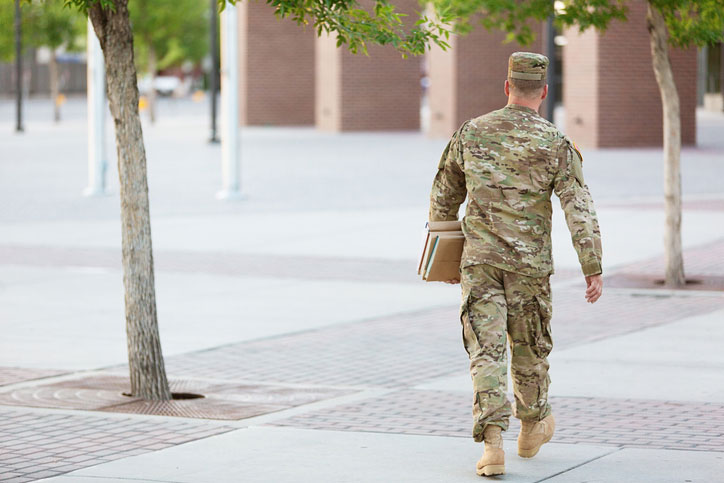Written by Dr. Emily R. Thornton, PhD, LCADC , Last Updated: November 13, 2025
Veterans and active-duty service members can utilize military educational benefits, including the Post-9/11 GI Bill (up to $29,588.79/year at private schools), Military Tuition Assistance ($4,500/year), and COOL credentialing assistance ($4,000 lifetime maximum), to become substance abuse counselors. These benefits cover degree programs, certification exams, and supervised experience hours required for state licensure.
Table of Contents
- Why Veterans Are Critical to the SUD Counselor Workforce
- Education Benefits for Active-Duty Service Members
- Military Behavioral Health Training Opportunities
- Using Your GI Bill for Substance Abuse Counseling Degrees
- Making the Transition from Military to Civilian Counseling Career
- State-Specific Veteran Educational Benefits
- Frequently Asked Questions
As an active-duty service member or veteran, you don't need anyone to tell you that substance abuse is a real struggle for people who have served. You know precisely what kinds of stress and trauma our men and women in uniform go through. It's not tough to understand how that sometimes involves turning to alcohol or drugs as a coping mechanism.
Many veterans wounded in the Global War on Terror were treated during precisely the period that the American healthcare system was busily overprescribing opiate painkillers. They were no less susceptible to becoming addicted than the rest of the American populace.

The National Survey on Drug Use and Health from the Substance Abuse and Mental Health Services Administration for 2023 reveals the scope of the problem. Among veterans aged 18 or older, an estimated 1.9 million engage in past-year illicit drug use. Around 420,000 veterans had a substance use disorder involving illegal drugs, and approximately 1.6 million experienced an alcohol use disorder.
Coming from a culture where toughing it out and focusing on mission over self is prized, it's no wonder that vets who need help have trouble asking for it.
A key finding from the survey will ring true to anyone who has served: nearly all veterans with a substance use disorder who didn't receive treatment didn't believe they needed it.
One way to break that logjam is for people with similar experiences and cultural backgrounds to reach out to them. That's why it's critical to the country to get more military veterans into the substance use disorder (SUD) counselor workforce.
Why Veterans Are Critical to the SUD Counselor Workforce
Serving your country creates a compact between you and other citizens. That's why veteran drug abuse sometimes feels like it's as much of a failing as the overall addiction crisis. Our support system for those who have honorably stepped forward to serve hasn't worked for the veterans.
That system is there for all veterans and service members, though. And it's just what you need to help you become a qualified substance use disorder counselor.
A range of supportive and educational benefits is available to both individuals still on active duty and those who have been discharged. They're more than enough to kick your substance abuse counselor career into high gear.
Education Benefits for Active-Duty Service Members

Substance abuse counseling is ultimately a triumph of education over addiction. Every state has specific training and degree requirements for licensed and certified counselors. You'll need to meet those to get any job in the field.
Fortunately, some of the most beneficial benefits available to service members are educational.
Military Qualities That Make Excellent SUD Counselors
Many of the same qualities that make a great SUD counselor will be drilled into you through your military career:
- Discipline and structure in the approach to client care
- Planning and organizational skills for treatment plans
- Accountability to clients and professional standards
- Strong ethics and responsibility in handling sensitive situations
That's all just an essential part of military basic training and culture. But if you're planning, you also have various benefits you can use while you're still on active duty to get the proper training and education for a career in addiction counseling.
Military Tuition Assistance (MTA) for Active-Duty Education
Probably the best of these benefits is MTA, Military Tuition Assistance. Every branch offers this benefit, with slightly different levels of support, to help you pay for college while you're still in the service. As of 2025, it will cover up to $4,500 per year at a cap of $250 per semester hour of tuition.
The best part of MTA is that you can apply it toward any study at any level of degree you choose. If you already hold a bachelor's degree, you can use it toward a Master of Science in Addiction Counseling. Suppose you have no college experience behind you. In that case, you can get started on a Bachelor of Science in Alcohol and Drug Counseling or even complete a full associate degree in substance abuse counseling.
Any of those options will help you hit the fast track to becoming a SUD counselor once you're out of the service.
Military Behavioral Health Training Opportunities
One of the significant draws of military service for decades has been that you can often translate your active-duty training and experience directly into skills applicable to civilian careers.
Substance abuse counseling isn't as straightforward as, say, diesel mechanics or cybersecurity. But that doesn't mean there aren't specific positions in the military that can help you build at least some of the skills you can use as an addiction counselor in civilian life.
Army Behavioral Health Specialist (MOS 68X)
In the Army, the most straightforward path is to secure a job as a MOS 68X Behavioral Health Specialist. These enlisted troops work under the supervision of psychologists and psychiatrists to deliver care for mental conditions, behavioral issues, and drug and alcohol problems. It's a good preview of SUD counseling work.

To prepare, you go through 16 weeks of specialized training at Fort Sam Houston. It covers SOAP notes and documentation, basic CBT (Cognitive Behavioral Therapy), and medication administration. It also includes at least two weeks of supervised, hands-on experience in behavioral health, similar to practicum work in an associate degree program.
Air Force Mental Health Service Specialists (AFSC 4C031)
U.S. Air Force Mental Health Service specialists undergo the same training as Army behavioral health specialists and perform similar work. This cross-service training ensures consistent, high-quality preparation for mental health and substance abuse support roles.
Navy Hospital Corpsman - Behavioral Health Technician
The Navy has a somewhat similar sub-role for the Hospital Corpsman rating, designated as HM-Behavioral Health Technician. This path runs through standard field medical service training and is available only as a C school assignment for a select few.
Military service means following orders, so there are no guarantees that your behavioral health assignments will specialize in drug and alcohol counseling even when you land one of these coveted roles. But the training and experience you'll gain while enlisted will be an invaluable preparation for a civilian SUD counseling job, no matter what.
COOL: CredentiOnlinepportunities Online
If you're fortunate enough to land in a MOS slot that includes some behavioral health or counseling work, you can take advantage of COOL: CredentiOnlinepportunities Online.
Available with every branch, COOL is a program that both identifies potential credentials and certifications that may align with your military training and responsibilities, and offers financial assistance to obtain them. That can bring up to $4,000 (lifetime maximum) your way to cover the costs of mandatory classes, required examinations, or filing and licensing fees for those credentials.
On the list for enlisted behavior techs are several necessary certifications that are common in the world of addiction counseling:
- National Certification in Nicotine and Tobacco Treatment (NCNTT) through NAADAC
- Registered Addiction Specialist through Breining Institute
- Alcohol and Drug Counselor Exam through IC&RC
- Advanced Alcohol and Drug Counselor Exam through IC&RC
- Clinical Supervisor Exam through IC&RC
- Master Addiction Counselor through NAADAC
- Peer Recovery Exam through IC&RC
- Prevention Specialist Exam through IC&RC
- Substance Use Disorder Certified Counselor I, II, III, or IV through CADTP
Some of those certifications are useful in seeking employment opportunities in SUD counseling after discharge. Others, depending on what state you're in, are a ticket to official board certification or licensure to practice.
Using Your GI Bill for Substance Abuse Counseling Degrees

For veterans, absolutely the most life-changing benefit comes through the GI Bill. Ever since the Greatest Generation returned home from World War II, various forms of GI Bill educational benefits have enabled them to attend school and altered the trajectory of their lives.
The current version of the GI Bill, the Post-9/11 GI Bill, can do the same for you by paying for your education as a substance abuse counselor.
Post-9/11 GI Bill Coverage (2025-2026 Academic Year)
For most service members being discharged today with 36 months or more of service behind them, the coverage is more than enough for a full bachelor's degree in addiction counseling. You may receive:
- Complete coverage of in-state tuition and fees at public universities (you may be eligible for in-state rates anywhere in the country, even if you haven't lived there), or up to $29,588.79 per year for private universities
- A $1,000 annual stipend for books and supplies
- Monthly housing allowance while in school is equivalent to an E-5 Basic Allowance for Housing
- Relocation costs to move to your university if you're coming from a rural location
You can receive these benefits for up to 36 months of college attendance. They can apply to either undergraduate or graduate programs, so if you already have a bachelor's degree, it's sufficient for a master's in substance abuse counseling.
GI Bill Eligibility Requirements
All that's necessary to qualify for this generous program is that you meet these requirements:
- You served for a total of at least 36 months (benefits are scaled down for less time in service)
- You served at least 90 days of active duty service after September 10, 2001
- You hold a high school diploma or GED
- You have been honorably discharged
Special dispensations are available if you served for fewer than 90 days but were wounded in action or honorably discharged with a service-related disability.
Yellow Ribbon Program for Private Universities
Although $29,588.79 per year seems generous when compared to GI Bill tuition limits, private university tuition often exceeds this amount. According to recent data from the National Center for Education Statistics, the average annual cost for undergraduate studies at private universities now exceeds $40,000.
That doesn't include room and board.
So to cover your costs at the most elite private substance abuse degree programs, you need a little extra help. You may find it through the Yellow Ribbon program.
Yellow Ribbon is actually a partnership between colleges themselves and the VA. Participating schools agree to put up half the cost differential between GI Bill rates and their own tuition costs. The VA covers the other half. That leaves you with no out-of-pocket expense for tuition and fees, just as was intended.
Coverage depends on the amount the school agrees to contribute and your eligibility tier. Not all students receive full coverage of the gap. The key point is that not every school participates in the Yellow Ribbon program. Even those who do may limit the number of students in the program simultaneously. Therefore, you'll need to be cautious when evaluating potential schools to ensure you're adequately covered.
Montgomery GI Bill Selected Reserve (MGIB-SR)
Guard and Reserve members may also be eligible for a separate GI Bill program, the Montgomery GI Bill Selected Reserve program. Since the standard Post-9/11 GI Bill eligibility is restricted to those who have served on active duty, this program fills in the gaps for reservists.
You must have at least a 6-year obligation and have completed your initial training to be eligible, and remain in good standing with your unit to be eligible for Montgomery GI Bill benefits.
MGIB-SR rates are adjusted annually, but as of the 2025-2026 academic year, they offer a directed payment of up to $466.90 per month for full-time enrollment. Unlike other GI Bill programs, this comes directly to you, so you're responsible for meeting any up-front payments to the university yourself. Less money is offered for part-time enrollment.
It's not as generous as the Post-9/11 GI Bill, but since you're still in the Guard or Reserves while taking advantage of this, you receive your other expected benefits and pay at the same time.
Making the Transition from Military to Civilian Counseling Career

Figuring out your next steps after separating from the service can be a significant challenge. With many choices facing you and numerous benefit programs available, it's a substantial difference from the days when structures were defined by standing orders and mission assignments.
The military has recognized the problem and stepped in to help solve it with one additional mandatory assignment: TAP, the Transition Assistance Program, which every service member will undergo before discharge.
TAP is a combined effort by seven different government agencies to help you figure out precisely what the next steps are in your substance abuse counseling career path, and how best to apply your benefits to accomplishing those steps. The career counseling and benefits explanations will go to good use, helping you untangle both your own benefits and the specific steps to licensure required for substance abuse counselors in your state.
DANTES: Turning Military Experience into College Credits
A significant resource you'll be introduced to in TAP is DANTES: Defense Activity for Non-Traditional Education.
It's an online clearinghouse for information and counseling regarding career planning and financial aid. But just as importantly, it's a path to finding college credits for your military experience.
CLEP and DSST are credit-by-examination programs that allow you to take tests for course credits at participating schools without actually having to take the course. The idea is that your military training can effectively deliver the same knowledge. You don't have to go through it twice, saving you both time and money.
This is a particularly valuable benefit for anyone who has served in a counseling or behavioral health role while on duty. However, DANTES will help any service member find alignments between their training and the classes they may need to take to earn credits for graduation.
VetSuccess on Campus (VSOC) Counseling
While your TAP assistance expires after you get that crucial DD-214 Certificate of Release or Discharge document into your hands, you're not entirely without advice and counseling at some schools.
That's because of a VA program called VSOC: VetSuccess on Campus.
At participating schools, a specialized counseling and advisory office staffed by experts in veteran's benefits and higher education is ready to answer your calls.
VSOC counselors both understand the ins and outs of admissions, course enrollment, and degree pathways at their university, as well as possessing command-level skills in negotiating the complexity of orchestrating and unscrambling VA education benefits.
That makes them a prime resource for anyone studying addiction therapy who needs to match their benefits to the sometimes complicated state rules for SUD counselor licensing.
State-Specific Veteran Educational Benefits

Your federal veteran educational benefits are generally quite generous for most veterans in most cases. However, it's also worth checking into any potential benefits available through your own state.
Many states offer their own programs to provide reduced or waived tuition fees at state schools to veterans who don't qualify for federal assistance or have encountered gaps in their GI Bill coverage.
State veteran benefits can be your most important resource if you served primarily in the National Guard, a state-based military organization.
It's pretty standard for states to offer some reimbursement or tuition coverage for soldiers currently serving in their National Guard units, a kind of state-based MTA. They may also provide additional benefits to make attending college more accessible, such as deferred payments or loans at preferential rates.
Scholarships and Private Support for Veterans
Another angle for military veterans seeking assistance with the costs of a substance abuse counseling degree comes through private assistance options, such as scholarships and grants specifically aimed at veterans.
There are many of these, offered both locally and nationally. Consulting with your school's financial assistance office is the best way to determine if you may be eligible for available financial aid in your area. However, there are also large national organizations, such as Student Veterans of America, that not only offer scholarships but also provide advocacy and other assistance to students who are veterans.
Of course, just because you're a veteran doesn't make you ineligible for all the other kinds of tuition assistance that are available to ordinary students. You should also spend time researching other scholarships, grants, and low-cost loan programs that are often available to students in addiction counseling studies.
The Veteran Advantage in SUD Counseling
No matter what paths you take toward getting the education and experience needed to become licensed as a substance abuse counselor, there's no question that military expertise will work to your benefit—the kind of educational resources you can tap into leaves those available for civilians in the dust.
Perhaps just as important, your experience will have given you discipline, the ability to compartmentalize, and the kind of initiative and 'get-it-done' attitude that are much needed in American addiction counseling today. In some ways, your degree is just a cherry on top. You'll find the best of both worlds as a veteran pursuing SUD counseling roles.
Frequently Asked Questions
Can I use the GI Bill for online substance abuse counseling?
Yes, the Post-Online Bill covers online degree programs. You'll receive full tuition coverage at public schools or up to the annual maximum at private schools. Your housing allowance online can be reduced to $1,013.50 for fully online programs (2025-2026 rates), rather than the location-based E-5 BAH rate.
What if I'm still on active duty and want to start my counseling education?
You can utilize Military Tuition Assistance (MTA) while on active duty, which provides up to $4,500 per year, broken down to $250 per semester hour. This allows you to begin your degree while serving, then transition to GI Bill benefits after discharge to complete your education. You can't use both MTA and GI Bill simultaneously.
Do my military behavioral health credentials transfer to civilian licensing?
Military training and certifications through programs like COOL can help you meet some state requirements, but you'll still need to complete state-specific education and examination requirements. Your military experience often counts toward the supervised clinical hours required for licensure. Check your state's specific licensing board requirements to determine how military credentials are applied.
Can Guard and Reserve members use the Post-9/11 GI Bill?
You can use the Post-9/11 GI Bill if you were activated and served at least 90 days of active duty after September 10, 2001. If you haven't been activated, you can use the Montgomery GI Bill Selected Reserve (MGIB-SR), which provides up to $466.90 per month while you maintain your Guard or Reserve status.
Does the Yellow Ribbon program cover all private schools?
No, participation in the Yellow Ribbon program is voluntary for schools. Not all private universities participate, and those that do may limit the number of students they accept into the program each year. Always verify Yellow Ribbon participation before enrolling in a private institution.
What's the difference between certification and licensure for substance abuse counselors?
Certification is typically a professional credential from organizations like NAADAC or IC&RC that demonstrates competency. Licensure is a state-regulated permission to practice, required in most states. You often need both. Learn more about the differences between certification and licensure requirements.
Key Takeaways
- Veterans face significantly higher rates of substance use disorders, making veteran counselors uniquely positioned to help this population.
- Active-duty service members can use Military Tuition Assistance for up to $4,500 annually while serving to begin their counseling education.n
- The Post-9/11 GI Bill covers up to $29,920.95 per year at private schools (2025-2026), plus housing allowance and books stipend for 36 months.
- Military behavioral health roles (MOS 68X, AFSC 4C031) offer valuable clinical experience that can be applied to civilian counseling careers.
- COOL credentialing assistance provides up to $4,000 for addiction counseling certifications like IC&RC and NAADAC credentials ls
- Yellow Ribbon program can eliminate out-of-pocket tuition costs at participating private universities when combined with the GI Bill.
- State veteran benefits, Guard and Reserve programs, and private scholarships can supplement federal educational benefits.s
Ready to Turn Your Military Service into a Substance Abuse Counseling Career?
Explore degree programs that accept military benefits and align with your state's licensing requirements. Start planning your path from service member to certified counselor.
2023 National Survey on Drug Use and Health data (most recent available as of November 2025) accessed from the Substance Abuse and Mental Health Services Administration. GI Bill and Military Tuition Assistance rates reflect 2025-2026 academic year maximums as published by the Department of Veterans Affairs and Department of Defense.








